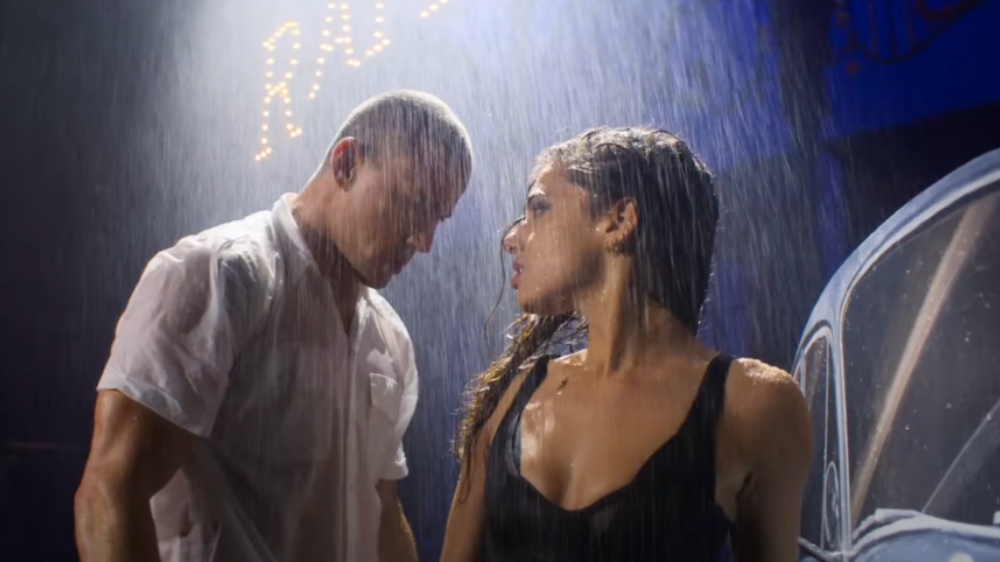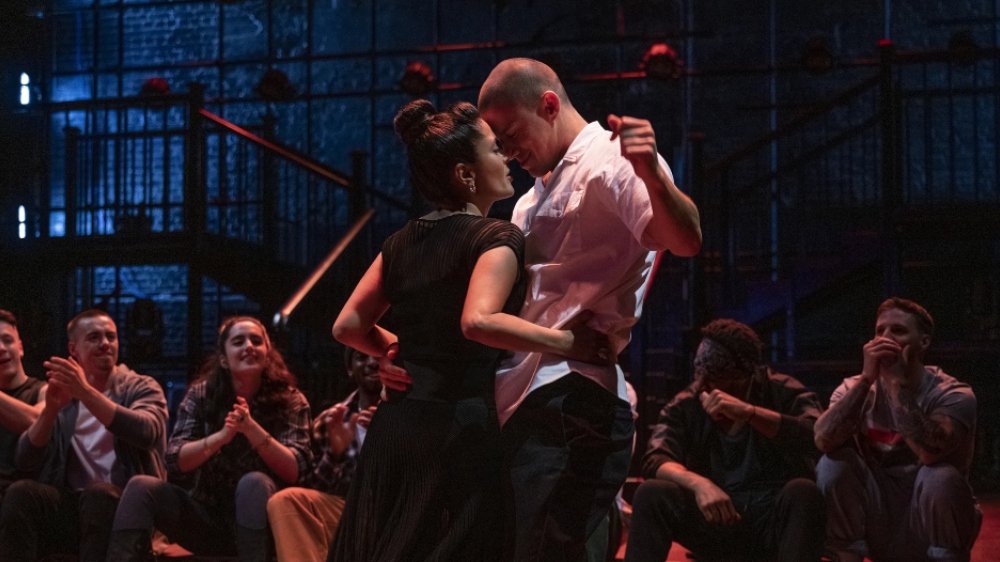It’s a pleasure to see Magic Mike’s Last Dance on the big screen.
Though Steven Soderbergh‘s unexpected third installment in the series was once intended for HBO Max, with Warner Bros. Discovery reversing course after installing the multiplex-minded David Zaslav as CEO, there’s an innate thrill in watching a mid-budget film aimed at adults play in theaters at a time when such entertainment has been all but erased at the box office by CGI-dominated action spectacle. And there’s a certain poetry in the fact that Soderbergh’s first true theatrical release in five years serves to close out his second trilogy following the Ocean’s films, as he bets big on the crowd-pleasing power of movie stars running wild.
Channing Tatum, still impressively light on his feet at the age of 42, returns one last time as the titular male entertainer with a heart of gold, who in the years since Magic Mike XXL has found himself bartending in Miami — his stripping days long since behind him and his furniture business claimed by the pandemic. One night, while mixing drinks at a fundraiser, he catches the eye of ultra-wealthy socialite Maxandra Mendoza (Salma Hayek Pinault), who learns of his past life and asks him for a private dance. Mike obliges, by first treating her to a lap dance and then turning her oceanside villa into his personal jungle gym. (A clever pre-aerobics beat sees him testing furniture installations around her living room to see if they can hold his weight.) As Mike strips ribbons of chiffon from Max’s fuchsia jumpsuit, she gives into his charms, shifting from flustered patron to impassioned dance partner before the two wind up in bed together.
It’s a fiercely sultry sequence with which to open the film, though Magic Mike’s Last Dance sashays away from such vigorously choreographed body heat in the scenes that follow. Inspired by Mike’s moves, Max — unhappy in her imploding marriage to a London-based media mogul — pulls him away from Miami with the promise of generously compensated work across the pond. Transplanted to the mansion Max shares with her quick-witted teenage daughter (Jemelia George) and their largely invisible manservant (Ayub Khan Din), Mike finds himself tasked with directing a play at the storied London theater that Max will own as part of her separation agreement. His mission, as dictated by Max, is not merely to stage the play in question, a dire-looking period piece called Isabel Ascendant. Instead, as Mike understands it, Max wants the play “stripped down, oiled, and spanked,” courtesy of a crew of male dancers she’s already begun recruiting.
The first Magic Mike, as insightful a film as any made about class struggle in the shadow of the 2008 economic crisis, focused on a group of working-class men struggling to move up the entrepreneurial ladder while exploring stripping as a form of vocational labor like any other; it raised the question of whether empowerment was possible within working practices so conditional on one’s physical objectification. A sunnier outing that traded in finance for feminism, Magic Mike XXL answered in the affirmative, sending the “cock-rocking kings of Tampa” on a high-spirited road trip through salacious subcultural hotspots, from drag shows to regional cons, on a mission of erotic liberation for all.

Certainly, no one could accuse Soderbergh of making the same movie twice, though Last Dance is closer in tone to the first Magic Mike, which he directed, than to his long-time assistant director Gregory Jacobs‘ quixotic-erotic sequel, which Soderbergh merely shot and edited. In stripping the franchise from the post-recession American South setting that previously informed its action, Soderbergh moves Last Dance closer to one of his beloved “process” films, as Mike and Max conspire and collaborate to carry off a live show despite the various obstacles that stand in their way.
It must be said that while the first two Magic Mike films captured sand bars and strip clubs with an eye to illuminating the South’s underlying labor and strife, no such comparable sociological treatment is extended to this sequel’s vision of the U.K. Instead, Soderbergh uses the shift from Miami to London to mask the real fish-out-of-water dynamic at play — that of the perennially cash-strapped Mike’s sudden immersion within Max’s upper echelon of privilege. As in the first Magic Mike, Soderbergh is eager to explore the connections between sex and finance, with Max’s exorbitant wealth initially casting her as the demanding patron to Mike’s artist.
But the quietly perceptive script by Reid Carolin blurs the parameters of that transactional dynamic by illuminating the possibility of deeper romantic feelings erupting between the two, even as money moves fluidly beneath the surface of Max’’ everyday life, its constant presence keeping her at a distance from the human connection she desires. (There’s a new type of catharsis to the moment when, mid-performance, dollar bills rain down on the upper-class audience, which is transfixed by the sight of bodies gyrating on a stage more accustomed to Shakespeare.)
One might also consider the fact that neither Mike nor Max can completely access the riches surrounding them. All the strings attached to Mike’s time in London keep him in a swirl of confusion, as if reliving his days as an exploited performer despite his shift from dancing to directing. And even as she contributes to this imbalance between them, Max’s efforts to assert the power of her own ideas are clearly rooted in a prolonged struggle against the trophy-wife associations she’s long endured in London; to that effect, her overhaul of Isabel Ascendant is something akin to turning money against money, stripping an old-fashioned drama of its uppity pretensions and rendering it alive again with raw human heat.
Still, her exploitation of Mike, as a sex worker she employs to help her realize desires she’s not yet completely in touch with, is a more ethically murky variation on the wish-fulfillment fantasias of Magic Mike XXL; at its diciest moments, Mike seems to retreat behind a mask of ingratiating chivalry, and whether he does so because he recognizes the threat posed by dissatisfied clients or genuinely wishes to please Max romantically — and whether he’s himself confident of the distinction — is one of Last Dance’s most tantalizing questions.

Though characters from previous films reappear in Zoomed-in cameos, the cast is filled out by performers from Magic Mike Live shows that have popped up in recent years. Choreographed by Alison Faulk and Luke Broadlick, their dance numbers consistently rise to the challenge of sparking Magic Mike’s Last Dance to life amid its more-protracted-than-usual setup, and Soderbergh gamely teases the play’s opening night in scenes like the one, set on the upper deck of a city bus, where Mike’s new crew puts the moves on a grumpy government inspector.
A born entertainer, Tatum can still light up the screen, and the sequences that set Mike free to move — particularly his opening seduction of an exceptionally willing Maxandra, and the finale’s sizzling reprise of this, in which he’s happily outmatched and out-maneuvered by the American ballet dancer Kylie Shea — are the film’s surest-footed. In contrast, Hayek Pinault doesn’t have as convincing a character to play, and the film’s efforts to center its story around Max’s pursuit of self-fulfillment (including a pointless voice-over by her daughter) never quite take.
Though Tatum’s pas de deux with Hayek Pinault’s character sets off the occasional romantic spark (somehow a first for the franchise, given that his past love interests were played by the charmless Cody Horn and an underserved Amber Heard), what registers most is the actor’s staying power as a leading man, his alternately lithe and scorching attention to physical movement and sensation. It seems likely that Magic Mike, with this closing installment, will be remembered most as a showcase for Tatum’s talents, and in that respect, there’s plenty about it to recommend.
Last Dance often feels like Soderbergh toying with the audience’s expectations of the franchise, crafting a cheekily idealistic send-off for his main character while stripping away most everything else we associate with Magic Mike, and that kind of tinkering by reduction is only satisfying in spurts. Still, there’s something oddly appropriate, a full decade after the first film hit theaters, about ending this character’s journey on a more muted and intimate note.
Stripping was never the dream for Mike, and meeting Max presents him with a more conventional, middle-aged fantasy of success, romantic as much as economic. With this final adventure, he’s lifted from the gritty, hip-gyrating revues that birthed him, sprinkling a series previously concerned with harsh realities with a welcome bit of movie magic, a more tame variety of happy ending.
Grade: B
Magic Mike’s Last Dance is now playing in U.S. theaters courtesy of Warner Bros. Pictures.



